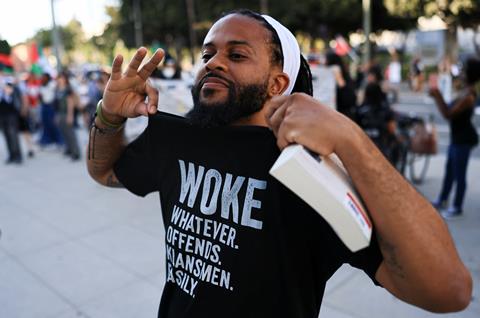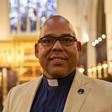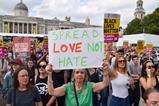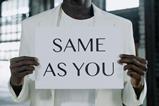The Church of England’s director of racial justice, Guy Hewitt, laments that even those claiming to be of God are often the ones stirring racial divisions. The work to break chains of discrimination must continue, he says

“The evil do not understand justice, but those who seek the Lord understand it completely.” (Proverbs 28:5)
The leadup to the fifth anniversary of the killing of George Floyd has been underwhelming.
There’s been a recent lurch to the right in global politics, which has brought with it veiled racist undertones. See for example, the recent US granting white South Africans refugee status as victims of ‘racial discrimination’ or the far-right politicians who fanned the flames of violence during the 2024 racist riots.
I experienced the impact of George Floyd from both sides of the pond. Following the struggle for justice for the victims of the Windrush scandal and an accumulated half-century of living, I concluded my public sector career and went ‘all-in’ with my church ministry. This sojourn took me to the Episcopal Church in Florida.
The three years that I served there, before providence would lead me back to London to work on racial justice in the Church of England, I pastored in the midst of the twin pandemics of Covid-19 and racism.
George Floyd remarked “I’m gonna change the world.” In becoming a symbol against racial injustice, his death has made a difference
The 9 minutes and 29 seconds that Derek Chauvin spent kneeling on George Floyd’s neck not only changed how we viewed the inhumane treatment of Black people in America, but sparked a global movement against racial injustice and the evil and pernicious sin of racism.
The Black Lives Matter protests that spread across the globe, including the UK, exposed what we who live it already knew; that Black, brown and other minoritised men and women are treated differently away from their homeland.
In the Church of England, following research in 2019 on the Church Commissioners’ historic involvement in African chattel enslavement, the apology by the General Synod in 2020 to the Windrush generation for the racism they experienced, and the admittance to institutional racism, the Church of England has embarked on a journey of truth-telling, introspection and reconciliation.
A £100m Fund for Healing, Repair and Justice has been agreed upon; a start to breaking the chains of discrimination and the legacy of the sin of racism and racial inequality that scars the lives of billions to this day. As part of this ongoing journey of reconciliation, a truth-telling symposium is being convened in Liverpool in June to further explore the Anglican Church’s involvement in African chattel enslavement and the lasting impact of colonialism.
At the local level, work to ensure that churches and cathedrals are welcome and solace for all have see ‘contested memorials,’ that is, memorials particularly to known slavers which act as symbols of injustice or cause offence are being removed.
With the killing of George Floyd, the Archbishops’ Anti-racism Taskforce was established, which produced ‘From Lament To Action,’ a theological framework and suite of actions designed to bring about real change.
The report containing specific actions for different arms of the Church, issues the warning that a failure to act could be a ‘last straw’ for many people of UK Minority Ethnic (UKME) backgrounds with devastating effects on the future of the Church.
It is reported that in his youth, George Floyd remarked “I’m gonna make a difference, I’m gonna change the world.” In becoming a symbol against race hatred and racial injustice, his death has made a difference.
The racist riots across England last summer remind us of the enormity of the task waiting to be addressed. The fact that some in the US are campaigning for a pardon for convicted murderer Derek Chauvin, along with recent efforts to push back on equity, diversity, and inclusion, are indicative of the fact that the road to anti-racism and racial justice still stretches a long way ahead.
Tragically there are some while claiming to be of God and seemingly oblivious to nativist privilege espouse division as exemplified in the Alliance for Responsible Citizenship UK conference, defined by some as the commingling of faith and politics parroting ‘Judeo-Christian values’ which has been challenged as code for Islamophobia.
In his Letter from Birmingham Jail, Martin Luther King, Jr. wrote, “I have been gravely disappointed with the white moderate. I have almost reached the regrettable conclusion that the Negro’s great stumbling block in the stride toward freedom is not the Ku Klux Klanner, but the white moderate who is more devoted to ‘order’ than to justice; who prefers a negative peace which is the absence of tension to a positive peace which is the presence of justice.”
Four days before he was assassinated, Dr King preached in his final sermon, “It’s an unhappy truth that racism is a way of life for the vast majority of white Americans, spoken and unspoken, acknowledged and denied, subtle and sometimes not so subtle. The disease of racism permeates and poisons a whole body politic. And I can see nothing more urgent than for America to work passionately and unrelentingly to get rid of the disease of racism.”
Over 55 years have passed since Dr King was assassinated and we’re still searching for the cure.
Nelson Mandela in his autobiography Long Walk to Freedom noted, “There is no easy walk to freedom anywhere, and many of us will have to pass through the valley of the shadow of death, again and again, before we reach the mountaintop of our desires.”
Just as our world leaders harnessed knowledge, skills, and technology to develop a vaccine for Covid, may we with similar intentionality and determination, and through God’s grace and his call to see the divine in every other, work to eradicate the global pandemic of racism and all forms of discrimination. Let’s keep hope alive.






































No comments yet